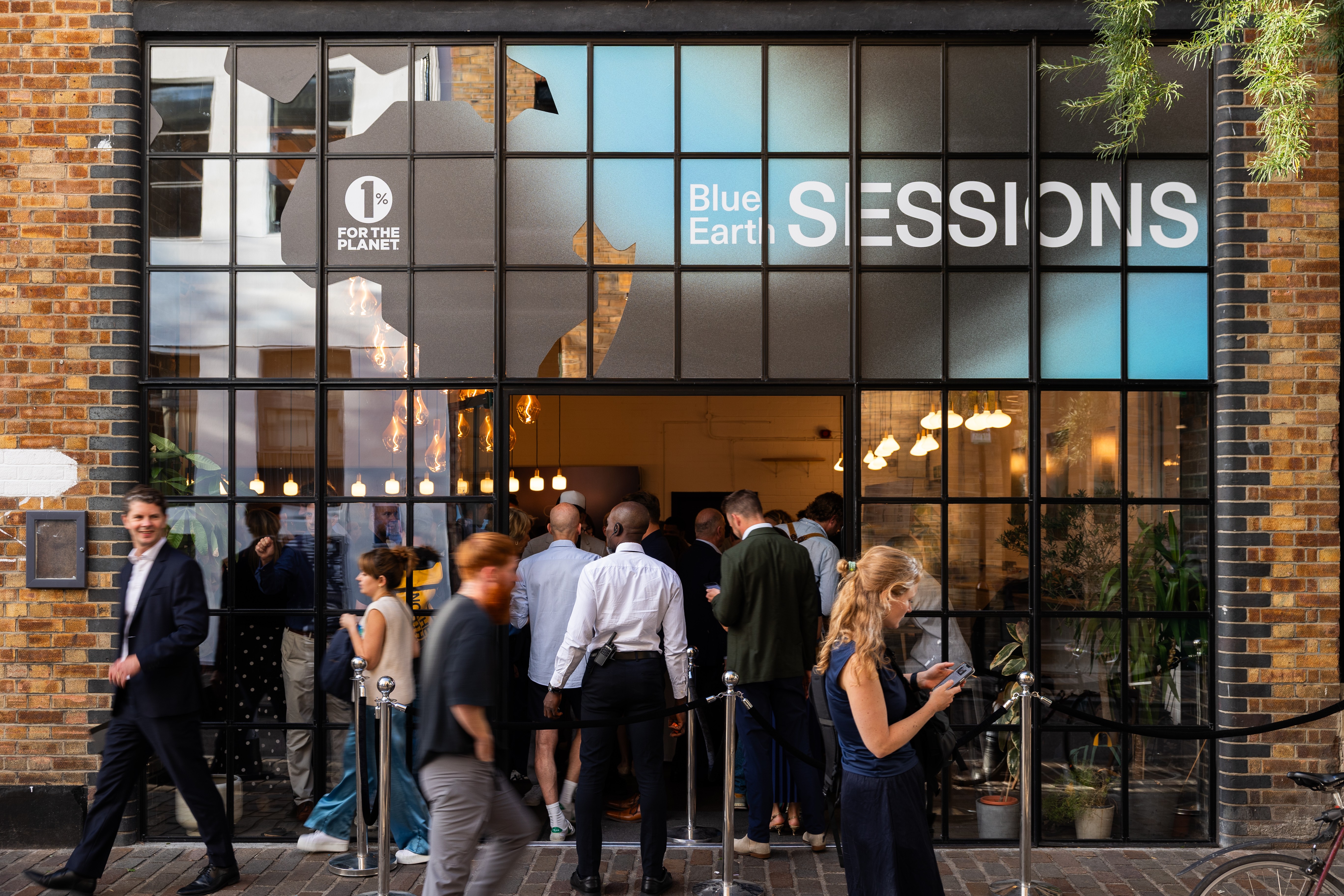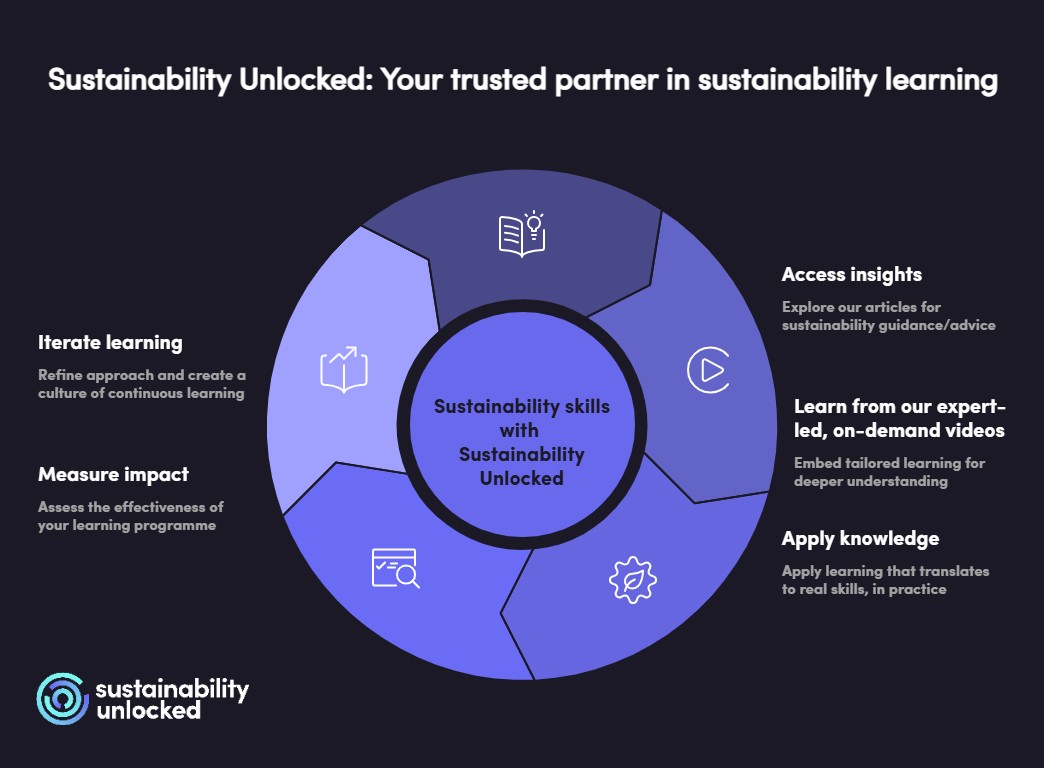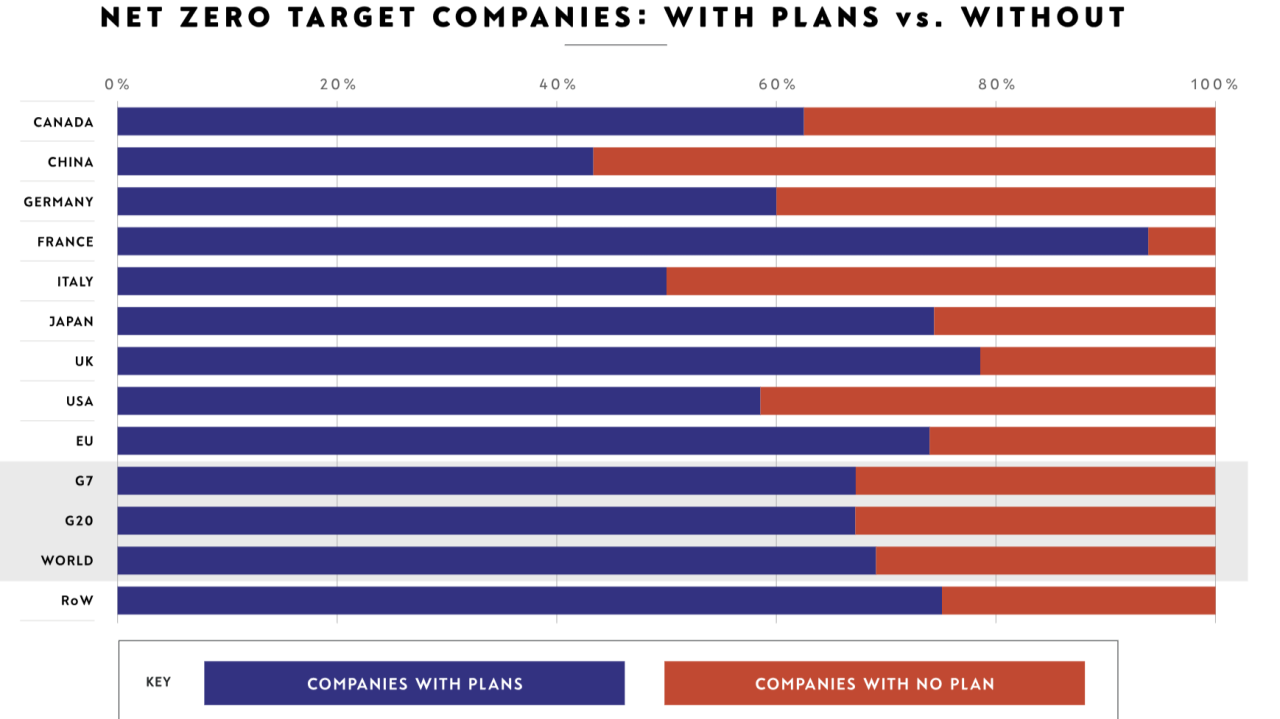
What's next for sustainability in 2025?

Learning Adviser
The trends, risks and opportunities defining the sustainability agenda

With the close of London Climate Action Week marking a busy end to the first half of 2025 — we provide highlights from our event discussions over the year so far, as well as resources for your further sustainability learning.
London Climate Action Week 2025 (LCAW 2025) was a fantastic close to an incredibly busy half year of events for the Sustainability Unlocked team. Starting with the Economist’s Sustainability Week, and then onto Innovation Zero, the FT Climate & Impact Summit, and LCAW 2025, it’s been a packed calendar, with many important learnings.
In this piece, we share some of the highlights of the key presentations and discussions. We also suggest a few learning resources to support your sustainability journey from here.
Key insights from 2025 so far
1. Sustainability strategy needs to focus on the value-creation opportunity
It has been a tough half year for ESG/sustainability in terms of political coverage, with the US rolling back climate policies following the re-election of Donald Trump, and other macroeconomic shifts and geopolitical conflict often taking centre stage in media headlines.
But as we explored in our recent piece on sustainability investment, commitment isn’t withering away. What is happening is that we are having more conversations about how sustainability needs to be linked more explicitly to these world issues — for example, how it shapes, and is shaped by, geopolitical developments and economic uncertainty, and its relevance to investment strategy, return on investment (ROI), wealth creation, and so on.
This chimes with wider research too. In a recent Morgan Stanley survey of 300 businesses, for example, 85% of respondents chose value creation as the top reason for delivering on their sustainability commitments — followed by regulatory and then moral obligation. This makes sense: there is so much opportunity in sustainability business — profit in the trillions overall, as one panellist stated at Innovation Zero.
Businesses should be asking, how can we unlock this value?
The conversation is increasingly focusing on sustainability as a way to future-proof business, providing resilience in uncertainty, creating top-line growth, driving innovation, reducing costs, and making organisations more credible long-term investment propositions.
2. Meeting objectives means sustainability learning at scale
We started building Sustainability Unlocked in 2020, because early adoption customers asked us to build a solution to address the sustainability skills gap. Sustainability skills back then were, perhaps, a ‘nice to have’. But we have since seen their rapid evolution to become a business necessity.
The challenge remains, however, to train enough people in the skills needed to meet sustainability targets — ie, upskilling at scale. Only that can stop a zero sum game in which companies compete to poach skilled professionals from each other, without actually building the level of skills required. Consider a statistic quoted at the Economist’s Sustainability Week: in the UK alone, 400,000 jobs are needed for the transition, but currently there is only the capacity to deliver around half of that.
Success will not lie in just hiring more staff, but also upskilling the existing workforce, establishing a foundation of understanding and then building on it. It’s about clearly communicating scientific concepts, aligning sustainability with data-literacy skills, and equipping employees with the skills and incentives they need at the right technical level to contribute meaningfully to meet firm-wide goals.
Articulating the challenge and putting in place the right infrastructure to support progress, have been recurrent themes across events in 2025 so far. In our blog Nine ways for rolling out sustainability training, we explore the key ways to ensure your learning strategy can support this process.
3. Organisations need to build a common language around sustainability
Sustainability is inherently cross-functional, impacting all functions including finance, operations, risk, HR, marketing, and more. This also reflects a theme common to our discussions at sustainability events: the need to understand the intersectionality of sustainability issues: biodiversity, climate, food, water, jobs, transport, economy, business and people. Sustainability does not work in silos, either as a concept or as a business practice.
Without a shared vocabulary, teams interpret sustainability goals differently, leading to misalignment, inefficiency, and conflicting priorities. A common challenge is that employees often have different levels of understanding about ESG, which hinders collaboration and progress.
Foundational training in core ESG and sustainability concepts creates a shared understanding around the “why”, “what” and “how”.
The result? People spend less time deciphering what something means, and more time acting on it. This is critical in high-pressure scenarios where regulatory changes, ESG reporting cycles, or supply chain disruptions are important, firm-wide responsibilities.
It also helps avoid ambiguity that breeds risk, and helps transform sustainability from an abstract concept into a practical organisation-wide capability that unlocks value.
4. AI is set to make a profound difference to sustainability approaches
Our guest speaker at LCAW 2025, Dr. Daniel Hulme, Chief AI Officer at WPP, provided invaluable insights into the AI-sustainability transformation ahead. With over 25 years of experience in AI, Daniel explored how AI's "six superpowers", including data analysis, predictive modelling and automation, could accelerate the journey towards net zero and significantly enhance sustainability strategies.
This idea was explored at Innovation Zero too, particularly in the context of how AI could be used in key areas like stabilising the electricity grid — particularly important in light of the black outs in Spain earlier in the spring, which we explored in our recent insight, The electrical zero: A global warning for the energy transition.
Important to remember, however, is that as AI becomes more embedded in our organisations and infrastructure, human skills like communication, critical thinking (particularly in the context of managing misinformation), relationship-building, and leadership will become even more important. While technology can provide data, people will be needed to interpret it, build trust with stakeholders, and drive change. Which brings us to…
5. Effective firm-wide communication is vital
Another point raised across many events is the importance of good communication to achieve sustainability goals. Tips we gathered for building effective sustainability messaging include:
- Understand your audience, the challenges they face in their roles/lives, and make your learning and action plan relevant to their needs and pain points.
- Use storytelling to make messaging around sustainability more memorable and impactful. One success that was mentioned at Innovation Zero, for instance, was Rewriting Earth’s Save our Grass Roots campaign, which focused on saving community green spaces, including local football pitches. The campaign deliberately avoided talking about ‘climate’, which can be seen as too political and/or distant.
- Look for the facts and trends where there are bright spots, and use productive rather than reductive language — for example, communication that focuses clearly and concisely on the positive action people can take to make a difference, rather than using terms like ‘you must’ or ‘have to’ do something, which can make people feel like they are powerless or a victim of circumstance.
- Highlight the opportunities arising from success in your sustainability strategy, mark achievements, and be bold in stating the breadth of your ambitions. People will buy into a grand vision, far more than vague hope, poorly articulated.
6. Sustainability needs leadership
We keep banging the drum on this one, but it’s evident in our work with clients, and from every event we attend: sustainability needs to be championed from the top, to ensure it is properly curated across the business. In our recent blog, 8 ways to build real leadership for change, we explore various aspects of great sustainability leadership, but it starts at board level and succeeds when ownership is clearly defined. Allocating different sustainability goals to different board members ensures issues can be more easily aligned to specific strategies and everyday decision making, rather than issues becoming siloed with one individual or team.
Leadership sponsorship is vital to ensure sustainability enhances and accelerates goals already on the business agenda whether it’s expanding into new markets; improving supply chain resilience; attracting and retaining top talent; strengthening regulatory positioning; or improving brand reputation.
7. Sustainability is a journey: Set backs are inevitable but transformation is achievable
ESG isn’t about claiming perfection. As our Head of Sustainability Content Maria Coronado Robles argued in her recent interview with Santander Navigator, it’s about “showing intent, making progress, and being honest about the course corrections needed along the way”.
Many of the events highlighted the progress already made, that despite inevitable challenges and set backs, businesses are already in the transition and have their eyes set on the long-term horizon. Many are working on clean tech that is going to be ready years from now, for example. There was a clear message: the investment has already happened. There is no turning back.
Opportunity ahead
We know that none of this is easy. The events raised many challenges for businesses as we tackle the climate and nature crisis endangering our world. And every business faces different problems — as well as a wide variety of potential solutions in turning things around and achieving real progress.
At Sustainability Unlocked, it is our mission to support businesses in the learning that can support that journey, taking a tailored approach to the companies we work with, and ensuring we deliver learning programmes that meet them where they are on the sustainability journey.
The opportunity is huge for those that get ahead of the curve and successfully embed sustainability. It enhances capabilities across strategy, business development, client relationships, risk and compliance, brand reputation, talent attraction, employee engagement and retention, new investment and revenue generation… The list is long of the ways in which the right approach to sustainability, underpinned by the right skills embedded across the workforce, can unlock a company’s full potential.
Discover more: Your learning plan 2025

Find out more at xUnlocked and Sustainability Unlocked.
Follow our insights at xUnlocked.com/news
- Nine steps to rolling out sustainability training
- Sustainability starts at the top: Eight ways to build leadership for change
- Why sustainability leadership must go beyond the CSO
- Are knowledge gaps blocking your sustainability success?
- Closing the skills gap: Five ways to improve learning engagement
Explore our learning videos in more depth, starting with these foundational videos at Sustainability Unlocked:
- Why our oceans matter, with sustainability leaders and ocean expert, Vincent Kneefel
- What is greenwashing?, with Keith Mullin, Founder of KM Capital Markets
- UN recommendations for executing net zero, with John Lang, Lead at Net Zero Tracker
Contact us today to find out more about how Sustainability Unlocked could help your business close the sustainability skills gap.
Share "What's next for sustainability in 2025?" on
Latest Insights

Lights in the fog: Positive signals for sustainability investment
2nd October 2025 • Henry White

































